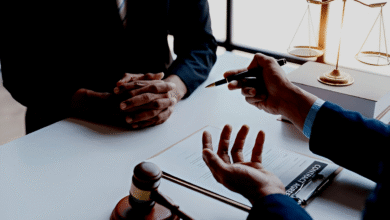
Arrested in the UK Here’s What to Do Legally
Arrested in the UK Here's what to do legally Know your rights get a solicitor and protect yourself during police questioning.
Arrested in the UK? Here’s what to do legally to protect your rights and ensure a fair process. Being detained or arrested can be a stressful experience, but knowing your legal rights is crucial. The UK legal system provides specific protections for individuals under arrest, including the right to remain silent, the right to legal representation, and the right to be treated fairly. Understanding these rights can make a significant difference in the outcome of your case.
If you find yourself arrested in the UK, staying calm and following proper procedures is essential. The police must follow strict guidelines, and any breaches could impact your case. This guide will walk you through the immediate steps to take, from requesting a solicitor to what to expect during Arrested in the UK. By knowing what to do legally, you can safeguard your interests and navigate the process with confidence.
Arrested in the UK Here’s What to Do Legally
The Arrest Procedure
If you are arrested in the UK, the police must follow the rules set out in the Police and Criminal Evidence Act (PACE) 1984. An officer can only arrest you if they have reasonable grounds to suspect your involvement in a crime. They must clearly state that you are being arrested, inform you of the reason (unless doing so would harm an ongoing investigation), and caution you by saying “You do not have to say anything, but it may harm your defence if you do not mention when questioned something which you later rely on in court. Anything you do say may be given in evidence.” You should not resist arrest, even if you believe it is unfair, as this could lead to additional charges. Instead, remain calm and wait until you can speak to a solicitor.
Your Rights When Arrested
One of the most important rights you have when arrested is the right to remain silent. While you must provide your name, address, and date of birth, you are not obligated to answer further questions until you have consulted a solicitor. Anything you say can be used as Arrested in the UK, so it is often advisable to wait for legal advice before making any Arrested in the UK. Additionally, you have the right to Legal representation (a solicitor can be present during questioning). Notify someone (a friend or family member) about your arrest. Access an interpreter if you do not speak English fluently. Request medical assistance if required.
Police Questioning and Interviews
Police interviews are a critical part of the process. You will be questioned under caution, meaning anything you say can be Arrested in the UK in court. It is highly recommended to have a solicitor present, as they can advise you on how to respond and ensure the police follow proper procedures.
If you are under 18 or considered Arrested in the UK, an appropriate adult (such as a parent or social worker) must be present during questioning. The police must also provide regular breaks and ensure you are treated fairly throughout the process.
Police Station Processing
After arrest, you will be taken to a police station and handed over to the custody officer, who is responsible for your Arrested in the UK. They will Record your personal details (name, address, etc.). Arrested in the UK a search (removing personal items for safekeeping). Explain your rights, including The right to free legal advice (a duty solicitor is available 24/7). The right to notify someone (e.g., a family member or friend) of your arrest. The right to medical help if you’re injured or unwell. The right to see the Codes of Practice (rules the police must follow).
Detention and Bail
After arrest, the police can detain you for up to 24 hours (or 36 hours for serious offenses). If further investigation is needed, they may extend this period with authorization. At the end of the detention period, the police must decide whether to Arrested in the UK you without charge. Release you on bail (with or without conditions). Charge you with an offense If you are released on bail, you may have to return to the police station at a later date. Breaching bail conditions can lead to re-arrest, so it is essential to comply with all requirements.
Legal Representation and Solicitors
Having a solicitor is crucial when dealing with an arrest. A legal professional can Advise you on the best course of action. Arrested in the UK unlawful detention or improper police conduct. Help negotiate bail conditions. Represent you in court if charged. Even if you believe you are innocent, legal advice can prevent mistakes that may harm your case. The government provides free legal aid for those who cannot Arrested in the UK a solicitor.
Court Proceedings and Potential Outcomes
Court Process and Hearing
If you are charged after being arrested in the UK, your case will progress through the court system. For summary offenses (minor crimes), your hearing will be at a Magistrates’ Court, where cases are typically resolved faster. For indictable offenses (serious crimes like robbery or assault), your case will go to the Crown Court, where trials involve a jury. Key stages include Plea hearing You’ll enter a plea of guilty or not guilty. Disclosure The prosecution must share evidence against you. Trial Witnesses may be called, and evidence examined (if pleading not guilty). Sentencing If convicted, the judge will determine punishment. Your solicitor will challenge weak evidence, present defenses, and argue for the Arrested in the UK possible sentence if found guilty.
Possible Outcomes After Trial
The court’s decision depends on the crime’s severity, your criminal record, and mitigation presented. Potential outcomes include Acquittal Found not guilty, with no conviction. Fines or Compensation Financial penalties for minor offenses. Community Orders Arrested in the UK work, curfews, or rehabilitation programs. Suspended Sentence Jail time postponed unless you reoffend. Custodial Sentence Immediate prison time for serious crimes.
What Not to Do When Arrested
Do not resist arrest This can lead to additional charges. Do not give false information Lying to the police can worsen your situation. Do not sign anything without legal advice Always consult a solicitor first. Do not discuss your case with others in custody Conversations may be recorded.
Read More: Prenuptial Agreements in the UK: Are They Legally Binding?
Conclusion
Arrested in the UK? Here’s what to do legally to ensure your rights remain protected throughout the entire process. Being detained can be a daunting experience, but by staying calm, asserting your rights, and seeking legal advice immediately, you can navigate the system more effectively. Remember, you are entitled to free legal representation, and anything you say can be used in court, so always consult with a solicitor before speaking to police. Taking these steps can make a crucial difference in the outcome of your case.
If you find yourself arrested in the UK, don’t panic knowledge is your best defence. From the moment of arrest to potential court proceedings, understanding your legal rights ensures you’re treated fairly. Whether it’s challenging unlawful detention or building a strong defence, the right actions early on can significantly impact your future. Always priorities getting expert legal help, as it’s your surest path to safeguarding your freedom and securing the best possible resolution.
FAQs
Can the police arrest me without a reason?
No, the police must have reasonable suspicion that you were involved in a crime to arrest you.
Do I have to answer police questions?
You have the right to remain silent, but you must Arrested in the UK your name, address, and date of birth.
How long can I be held in custody?
Typically, up to 24 hours (extendable to 36 hours for serious offenses).
Can I get free legal advice if arrested?
Yes, you are entitled to free legal representation at the police station.
What happens if I’m released on bail?
You may have conditions to follow and must return to the police station when required.







